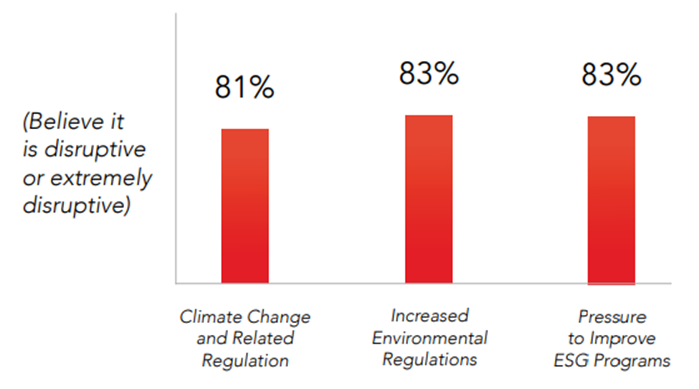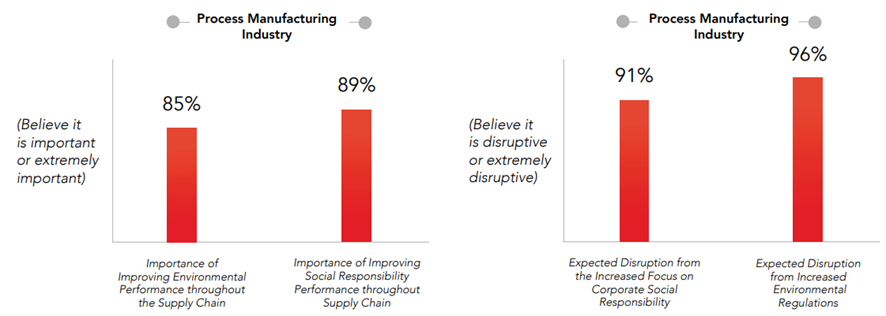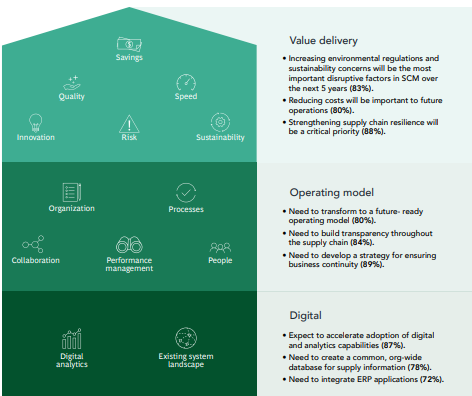This is an excerpt of the report “The Future of Supply Chain Management 2021–2025: Balancing Sustainability, Resilience and Cost”, focusing on the topic above. For the Executive Summary of the report, please, refer to the second part of this post.
CAPS Research, BCG
Bryan Fuller, Geoff Zwemke, Daniel Weise, Alex Dolya, Chitt Jha
May 2022
The Rising Importance of Sustainability
The vast majority of respondents across industry segments believe increasing environmental regulations and growing sustainability concerns will be the most important disruptive factors in supply chain management over the next five years. Other experts agree.
“At ISM®, we’re also seeing and hearing about the continued focus on sustainability and ESG. It’s a driver for decisions about business, suppliers, and talent as companies set themselves up for successful future operations.” — Tom Derry
Over 80% of respondents expect to see climate change and pressure to improve their ESG profiles driving an increase in regulations, which will have a strong disruptive impact on their operations (Figure 1).
… increasing environmental regulations and growing sustainability concerns will be the most important disruptive factors in supply chain management over the next five years.
Figure 1: Supply chain executives foresee extreme disruption to their operations due to increasing environmental regulations and sustainability concerns

Among industry segments, process manufacturers place the greatest emphasis on improving sustainability and social responsibility performance — and they also expect to experience the most disruption from doing so (Figure 2).
Figure 2: Process industry leaders place the highest value on achieving social and environmental goals — and expect to experience the most disruption from pursuing them.

It’s important to note that environmental-related disruption, while it may require operational changes causing initial stress, can also result in positive outcomes.
When BCG analyzed 500 companies and interviewed 50 supply chain leaders for the 2020 report “Your Supply Chain Needs a Sustainability Strategy ,” we found that over time, improving environmental performance can help companies significantly boost business results.
It’s important to note that environmental-related disruption, while it may require operational changes causing initial stress, can also result in positive outcomes. …over time, improving environmental performance can help companies significantly boost business results.
There are several reasons for this.
While sustainable processes and materials are more expensive, environmental commitments enhance a brand’s reputation.
Our research found that many consumers are willing to pay a premium to purchase sustainable products.
Environmentally-friendly companies are also better positioned to attract talent in today’s highly competitive market.
A greener profile will make companies more attractive to investors in general, and is essential for those focused on ESG objectives.
Firms that can demonstrate a clear commitment to sustainability are gaining access to more investor resources, speeding growth and innovation.
EXECUTIVE SUMMARY

The Future of Supply Chain Management 2021–2025: Balancing Sustainability, Resilience and Cost [Executive Summary]
CAPS Research, BCG
Bryan Fuller, Geoff Zwemke, Daniel Weise, Alex Dolya, Chitt Jha
May 2022
The Future of Supply Chain Management
Every five years, the Center for Advanced Procurement Strategy (CAPS), a joint initiative of the Institute for Supply Management (ISM) and Arizona State University, conducts a global survey of practicing supply chain executives and knowledge experts, asking about the challenges they expect to face and their strategies and performance goals in the coming years.
For the 2021 survey, CAPS worked with BCG to query 157 supply management leaders across industry segments, including discrete manufacturing, process manufacturing, and service industries.
We gained their insights on a host of important topics, including:
- Supply chain market dynamics
- Cost savings and efficiency
- Risk and resilience
- Environmental, social, and governance (ESG) regulations and initiatives
- Supplier management
- Supply chain operations
- Human resources
- Technology
Key Insights from Procurement and Supply Chain Leaders
Two trends in the new survey stand out.
First, fulfilling environmental, social, and corporate governance (ESG) goals has assumed paramount importance.
The second notable trend is a greater emphasis on achieving resilience in the face of unpredictable raw materials shortages and logistical challenges, which were greatly exacerbated by the pandemic.
Two trends in the new survey stand out: (1) fulfilling environmental, social, and corporate governance (ESG) goals ; (2) … a greater emphasis on achieving resilience
The schematic below summarizes some of the survey’s most important findings.
Summary Figure: Highlights from the 2021–2025 CAPS and BCG global survey of procurement leaders

ZOOM VIEW

Value delivery
- Increasing environmental regulations and sustainability concerns will be the most important disruptive factors in SCM over the next 5 years (83%).
- Reducing costs will be important to future operations (80%).
- Strengthening supply chain resilience will be a critical priority (88%).

Operating model
- Need to transform to a future- ready operating model (80%).
- Need to build transparency throughout the supply chain (84%).
- Need to develop a strategy for ensuring business continuity (89%).

Digital
- Expect to accelerate adoption of digital and analytics capabilities (87%).
- Need to create a common, org-wide database for supply information (78%).
- Need to integrate ERP applications (72%).
“Going forward, CPOs will need to constantly balance tradeoffs between sustainability, resilience and cost.
CPO KPIs and capabilities will need to evolve respectively to reflect all these priorities. This will be the most challenging task for the next five years,” — Alex Dolya
CPOs need also to rethink through their approach to suppliers, given their need to balance priorities.
If in the past, cost savings were primary objective of supplier engagement, today CPOs need to ensure that suppliers can deliver in the face of decarbonization, supply resilience and cost competitiveness.
Getting the equation right could prove tricky.
CPOs need also to rethink through their approach to suppliers, given their need to balance priorities. Getting the equation right could prove tricky.
Structure of the report
· The Future of Supply Chain Management
· Key Insights from Procurement and Supply Chain Leaders
· The Rising Importance of Sustainability
· The Need to Improve Supply Chain Resilience
· Sustainability and Resilience Top Cost Concerns
· 2021 vs. 2016: Different Change Drivers, Different Strategies
· Upgrading Supply Chain Technology
· Looking Forward
Report Authors
Bryan Fuller
Senior Director, Procurement, Solidigm, Former Executive Director, CAPS Research
Geoff Zwemke
Director of Product, CAPS Research
Daniel Weise
Managing Director and Partner, BCG, Global Leader for BCG Procurement Practice, CEO of Inverto
Alex Dolya
Managing Director and Partner, BCG, Asia Pacific Leader for BCG Procurement Practice, Global Leader for Procurement and SCM in Energy and Mining, BCG
Chitt Jha
Partner and Associate Director, BCG, BCG Global Expert on Procurement Resilience, Sustainability, and Digital
Originally published at CAPS Research.













